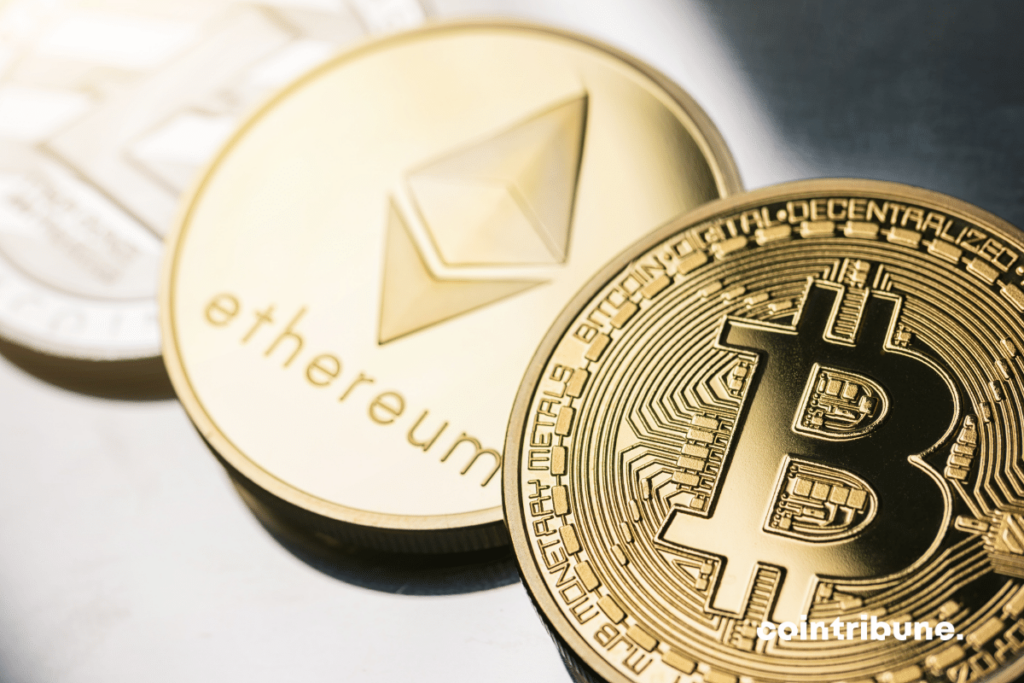Differences Between Altcoins and Bitcoin: A Complete Guide
The rise of cryptocurrencies has disrupted traditional financial outlooks, ushering in a new era of digital currencies. Bitcoin, the first cryptocurrency, paved the way for a multitude of altcoins, each with its own attributes and promises. While bitcoin continues to reign as the undisputed leader, altcoins bring fierce competition, armed with innovations and specific applications. This article will unveil the nuances between bitcoin and altcoins, their respective advantages and disadvantages, and essential considerations for investing in these assets.

Bitcoin: The Pioneer of Cryptocurrency
Bitcoin is considered the first decentralized digital currency, marking the beginning of a new era in digital finance. As a pioneer, it laid the foundations upon which the entire cryptocurrency ecosystem rests today.
History and Origin of Bitcoin
Bitcoin was introduced as a concept in a white paper published in 2008 by an individual, or group of individuals, using the pseudonym Satoshi Nakamoto. The goal was to create a peer-to-peer electronic currency that did not rely on any central authority. The Bitcoin network became operational in January 2009 with the mining of the genesis block, giving birth to the first unit of the cryptocurrency, BTC. This launch marked the beginning of crypto trading and paved the way for a new form of investment.
Functioning and Security
The operation of bitcoin relies on blockchain technology, which records all transactions in a public and immutable ledger. The security of the network is ensured by mining, a competitive process that validates and records transactions using Proof-of-Work consensus. This method ensures the integrity and chronology of transactions, making the network resistant to attacks and fraud.
Bitcoin in the Current Economy
Bitcoin holds the largest market share and highest market capitalization among all cryptocurrencies, making it a barometer for the sector. Its price is followed by millions of investors and is considered an indicator of the overall health of the crypto market. Although subject to price fluctuations, bitcoin has maintained a long-term upward trend, attracting the attention of institutional investors and individual traders looking for diversification in the cryptocurrency space.
Altcoins: The Universe of Alternatives to Bitcoin
Since the advent of bitcoin, the term “altcoin” has been recurring in the cryptocurrency space. It refers to any digital currency other than bitcoin. These alternatives emerged to address specific needs not covered by bitcoin, offering constant diversity and innovation in the sector.
Diversity of Altcoins
Altcoins vary greatly in terms of underlying technology, objectives, and applications. Ethereum, with its native crypto ether, introduced smart contracts that automate transactions without intermediaries. Other altcoins like litecoin were designed to be faster and lighter, while currencies like Monero focus on privacy. This diversity reflects the richness of the cryptocurrency ecosystem and shows that the market goes far beyond the simple concept of digital currency.
Technological Innovation of Altcoins
Altcoins continue to innovate, whether through improving existing blockchain or introducing new features. For example, some altcoins use staking to validate transactions, which represents a less energy-intensive alternative to bitcoin mining. Additionally, some altcoins leverage sidechain technology to offer increased scalability and interoperability with other blockchains.
Market and Trading of Altcoins
The altcoin market is dynamic and subject to rapid fluctuations, offering investors and traders potentially high-profit opportunities. Altcoin trading can be influenced by factors such as technology adoption, strategic partnerships, and regulatory updates. Investors are increasingly interested in altcoins due to their growth potential and the opportunity to diversify their portfolios beyond BTC, despite a higher level of risk associated with their volatility and relative liquidity.

Advantages and Disadvantages of Bitcoin Compared to Altcoins
Bitcoin has set a standard for digital currencies and continues to dominate the market. However, with the emergence of altcoins, cryptocurrency investors and users are often faced with the decision of choosing between the flagship crypto and its alternatives. Each presents distinct advantages and disadvantages based on various factors, including technology, adoption, security, and investment potential.
Advantages of Bitcoin
Bitcoin benefits from a long history of security and reliability. Based on the oldest and most tested cryptocurrency network, it has withstood many attacks and demonstrated a robustness that inspires confidence. Its blockchain is considered one of the safest, thanks to the massive computing power that secures its transactions and its Proof-of-Work consensus mechanism.
Bitcoin is the most liquid cryptocurrency, with the largest number of trading pairs available on markets. It is widely accepted as a means of payment and investment, with increasing adoption by businesses and consumers. This universal acceptance often makes it the entry point for those who are new to the world of cryptocurrencies.
Bitcoin is often dubbed “digital gold” due to its ability to retain value over the long term. Despite its volatility, many investors see it as an inflation hedge and a hedge against economic uncertainties.
Disadvantages of Bitcoin
While all crypto assets are volatile, the price of bitcoin can be particularly subject to significant fluctuations. This can be attributed to various factors, including regulatory developments, changes in institutional adoption, and market sentiment.
The technical limitations inherent in Bitcoin’s original design mean that the network can process only a limited number of transactions per second, leading to delays and higher fees during periods of network congestion.
A large portion of the circulating bitcoins is held by a small group of investors and miners. This concentration of wealth can lead to market manipulation and inequality in the distribution of assets.
Advantages and Disadvantages of Altcoins
Altcoins are often at the forefront of innovation, offering specialized solutions and improvements over bitcoin. For example, Ethereum with its smart contracts has paved the way for a multitude of decentralized applications, and cryptocurrencies like Ripple (XRP) aim to optimize cross-border payments.
Altcoins often have a lower market cap than bitcoin, meaning they have the potential for rapid value growth. For investors willing to take risks, this can translate into higher returns.
However, investing in altcoins carries higher risk. Their market is less liquid and more subject to volatility. Additionally, many altcoins do not have the same recognition or level of adoption as bitcoin, making them more susceptible to market fluctuations and loss of value.
Investing in Bitcoin or Altcoins: What You Need to Know
Investing in cryptocurrencies has become an essential component of many modern investment portfolios. Here’s what you need to know to make informed investment choices in crypto.
Investing in Bitcoin: Advantages and Risks
Bitcoin as the first cryptocurrency has set the standard for market valuations and remains the undisputed leader in terms of market capitalization. Its performance history shows a general upward trend despite periods of significant volatility, attracting many investors looking for long-term growth. Bitcoin enjoys superior liquidity, making it easy for investors to enter and exit positions. Its widespread adoption as a means of payment and investment positions it as a currency of entry for investors and cryptocurrency users.
Despite its dominant position, bitcoin is not immune to risks. Government regulations, changes in monetary policy, and fluctuations in demand can affect its price. Investors must be aware of these factors and incorporate them into their investment strategy.
Potential and Risks of Altcoins
Altcoins, such as ether, litecoin, and many others, offer diversity beyond simple financial transactions. They present innovative use cases, such as decentralized finance platforms and non-fungible tokens (NFTs), which can lead to substantial gains. Altcoin volatility can be significantly higher than that of bitcoin. This can offer short-term trading opportunities but also increases the risk of losses. Investors must closely monitor market movements for these assets.
Investing in altcoins requires careful evaluation. Investors must examine the technical strength of the project, the strength of the development team, the user community, and strategic partnerships. In-depth fundamental analysis is necessary to identify altcoins with sustainable growth potential.
Investment Strategies to Adopt
Diversification is a key strategy for managing risks in cryptocurrency investment. By spreading investments between bitcoin and a variety of altcoins, investors can reduce the impact of the volatility of a single asset on their overall portfolio.
Investors must constantly monitor the market and conduct analyses to adjust their strategies based on changing conditions. This includes understanding technical indicators, market trends, and news that may influence cryptocurrency prices.
Risk management is also important, especially in a market as unpredictable as cryptocurrencies. Investors must be prepared to adjust their positions, set stop-loss orders to limit losses, and not invest more than they can afford to lose.
The Future of Bitcoin and Altcoins
The future of bitcoin and altcoins is a major topic of interest for investors and market observers in the cryptocurrency space. With a remaining significant market capitalization, bitcoin continues to dominate the market as a benchmark and store of value. However, altcoins, driven by technological innovation and evolving use cases such as decentralized finance platforms and non-fungible tokens, are gaining ground. Future developments will depend heavily on government regulations, technological advancements, and the integration of cryptocurrencies into traditional payment systems. Volatility remains a key factor, with prices susceptible to be influenced by institutional adoption, public sentiment, and advances in security and scalability. The dynamic between bitcoin and altcoins is likely to persist, with altcoins continuing to challenge the status quo through innovation and specialization, while bitcoin maintains its status as the leading crypto asset by notoriety.
Conclusion
Bitcoin, with its established position and global recognition, offers some security and liquidity but is not immune to volatility. Altcoins, on the other hand, entice with their potential for innovation and rapid growth, although they carry higher risks. Investors must stay informed, analyze the market, and prudently manage their risks. The future of cryptocurrencies promises to be dynamic, with technological and regulatory developments shaping the landscape of digital investments.
Maximize your Cointribune experience with our "Read to Earn" program! For every article you read, earn points and access exclusive rewards. Sign up now and start earning benefits.
The Cointribune editorial team unites its voices to address topics related to cryptocurrencies, investment, the metaverse, and NFTs, while striving to answer your questions as best as possible.
The views, thoughts, and opinions expressed in this article belong solely to the author, and should not be taken as investment advice. Do your own research before taking any investment decisions.